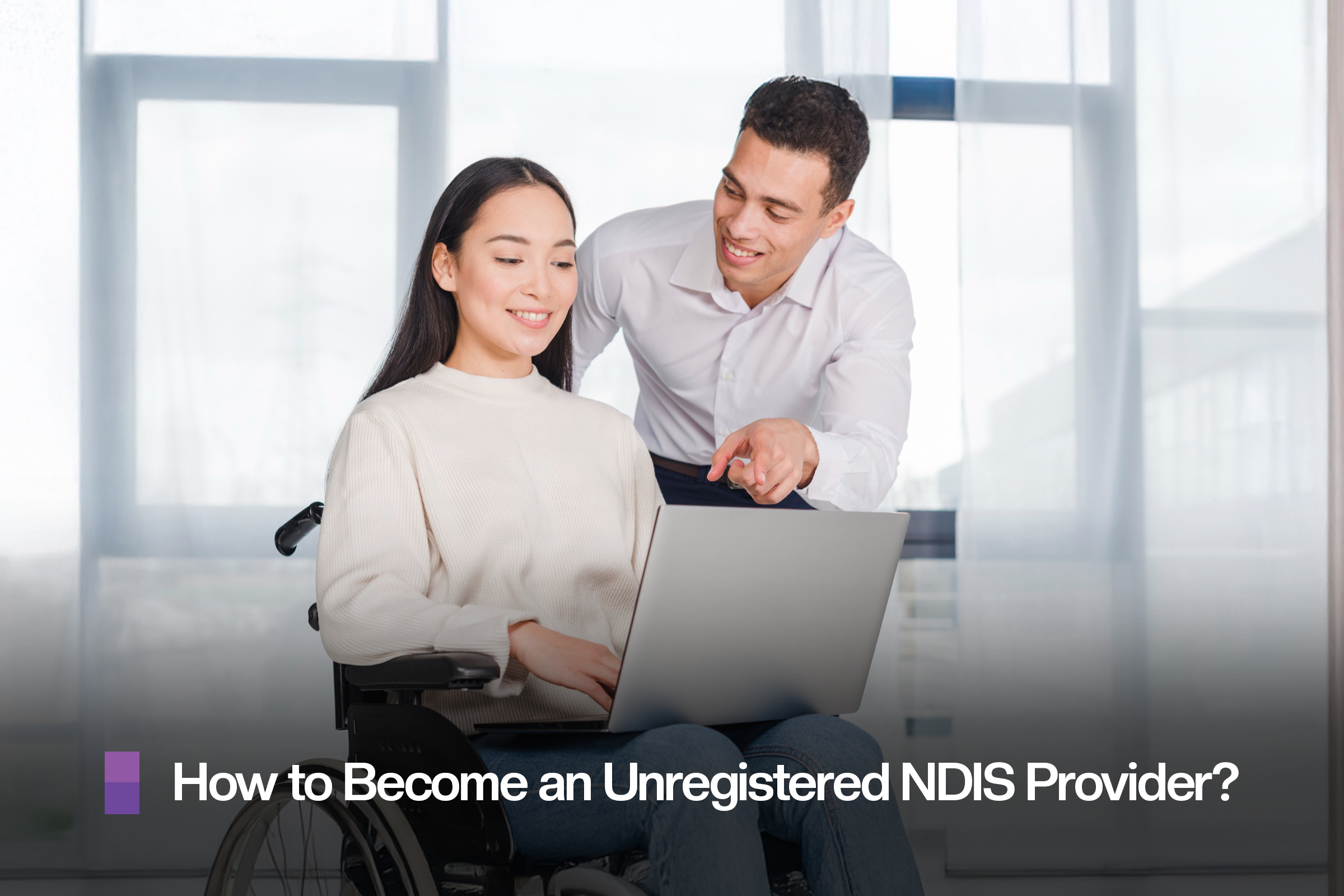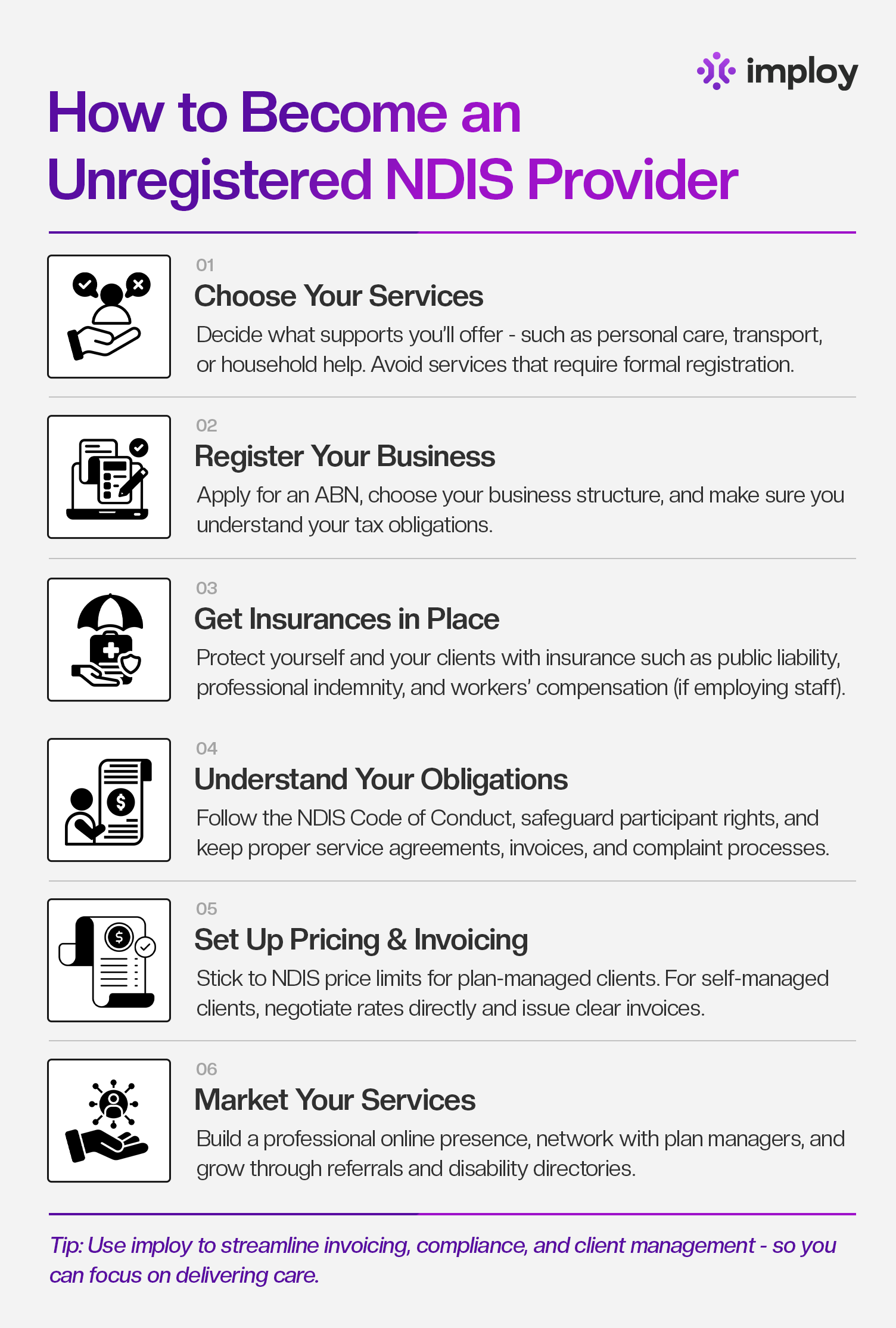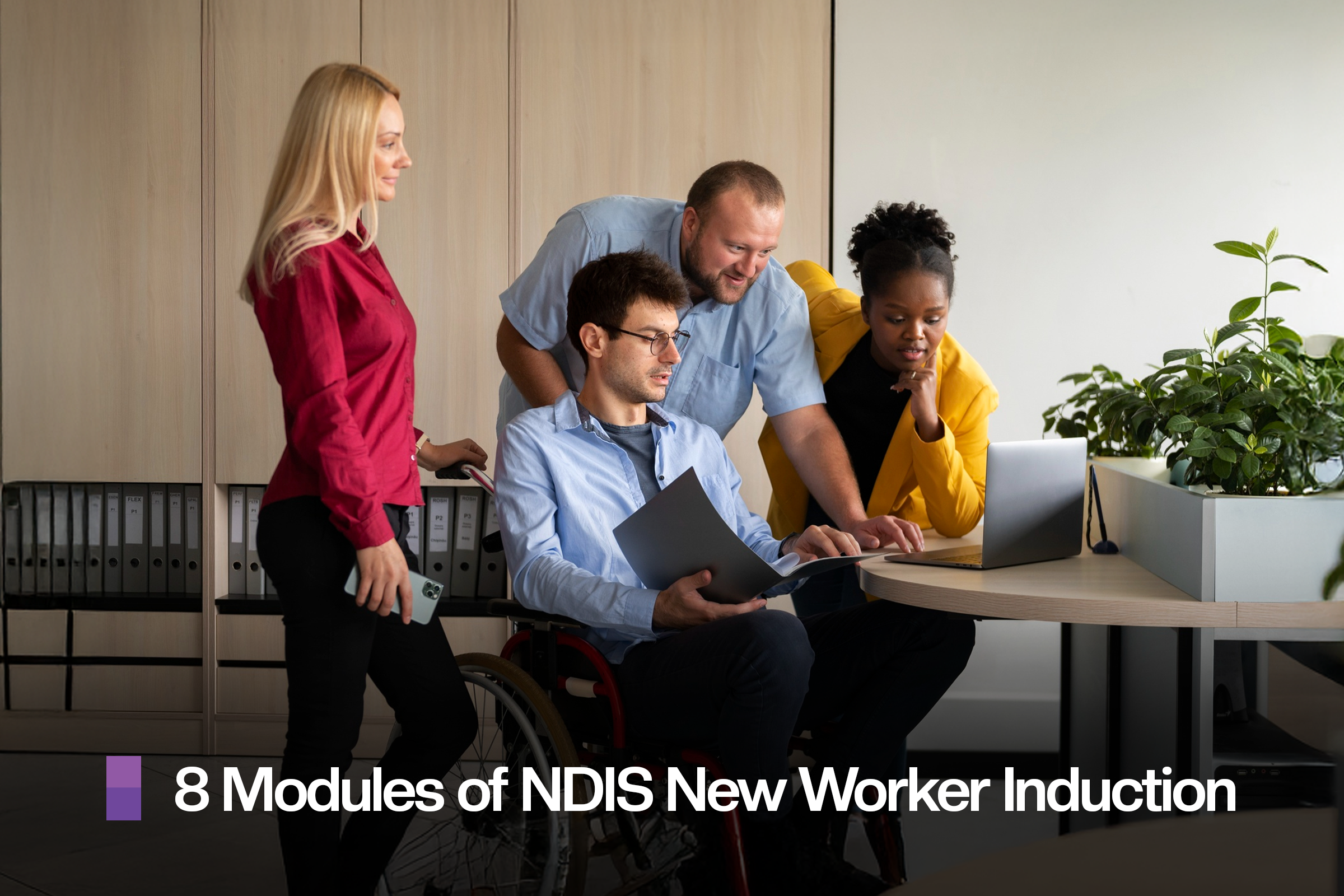How to Become an Unregistered NDIS Provider in Australia (2025 Guide)
Learn how to start your own unregistered NDIS business. Step-by-step setup guide for self-managed and plan-managed participants.

How to Become an Unregistered NDIS Provider (Step-by-Step Guide)
Starting an NDIS business doesn’t always mean registering with the NDIS Commission right away.
For many new providers, beginning as an unregistered NDIS business offers a smoother and more flexible entry into the sector. It allows you to work with self-managed and plan-managed participants, build experience, and refine your services before pursuing full registration.
If you’re exploring how to start an NDIS business and want to understand both pathways, our Steps to Start Your Own NDIS Business guide breaks down the entire process from setup and compliance to choosing whether registration suits your goals.
The National Disability Insurance Scheme (NDIS) gives Australians living with disability the freedom to choose who provides their support. While some providers register with the NDIS Quality and Safeguards Commission, others operate as unregistered NDIS providers.
In this guide, you’ll focus specifically on the unregistered pathway, what it means, the setup requirements, and when it might make sense to transition later into becoming a registered provider.
What is an Unregistered NDIS Provider?
An unregistered NDIS provider is an individual or business that delivers disability supports to participants without being formally registered with the NDIS Commission. Although they operate with greater flexibility, they are still required to follow key guidelines and uphold certain standards.
Pros & Cons: Unregistered Providers
Staying unregistered can be a good option for smaller businesses or those just starting out, as it keeps things simple and less costly. But there are trade-offs, especially around the kinds of services you can deliver and the clients you can work with.
Pros:
- Quicker start-up, lower immediate barriers: you can begin delivering certain support without going through registration.
- Lower operating costs: no registration fees, audits etc.
- Flexibility in relationships with participants: more direct invoicing, perhaps closer personal relationship since fewer regulatory constraints in some areas.
Cons:
- Limited client base: cannot service NDIA-managed participants, cannot offer certain specialist support.
- Perceived lower credibility: participants may prefer registered providers for assurances of quality and safety.
- Potential legal and compliance gaps: though unregistered providers are not subject to full audits, they are still bound to laws, codes of conduct, worker screening, etc. Mistakes or failures can still have serious consequences.
Why Become an Unregistered Provider?
While unregistered NDIS providers don’t have access to every opportunity available to registered providers, there are still plenty of reasons why this pathway appeals to many people starting out. From easier setup to greater flexibility, here are some of the key advantages of being an unregistered provider:
1. Quicker Start-up
Becoming an unregistered NDIS provider allows you to begin offering services without going through lengthy audits or complex registration processes. This means you can set up your business and start supporting participants much faster.
2. Lower Operational Costs
Since you don’t have to pay for registration, licensing, or regular compliance audits, your overheads are significantly reduced. This makes it easier to keep your business financially sustainable, especially when starting out.
3. Direct Participant Relationships
Working mainly with self-managed and plan-managed participants means you deal with clients directly. This often leads to stronger personal connections, better communication, and services tailored closely to individual needs.
4. Pricing Flexibility
Unlike registered providers, you’re not strictly bound to the NDIS price guide when working with self-managed participants. This flexibility lets you offer more competitive rates or package your services in ways that suit your clients.
5. Simplified Payment Process
Unregistered providers don’t use the NDIS portal for claiming payments. Instead, you invoice participants (or their plan managers) directly, which can make the payment process quicker and easier to manage.
Steps to Become an Unregistered NDIS Provider
Becoming an unregistered NDIS provider doesn’t require formal registration with the NDIS Commission, but it still involves setting up your business properly and ensuring you meet key legal and ethical standards. Below are the essential steps to help you get started the right way.

1. Choose Your Services
The first step is deciding what type of support you’ll deliver. Many unregistered providers focus on everyday support such as personal care, community participation, transport, skills development, or household tasks like cooking and cleaning. It’s important to stay within the services you are qualified to provide and avoid those that legally require registration, such as Specialist Disability Accommodation or behaviour support.
2. Register Your Business
Even though you’re not registered with the NDIS, you still need to set up your business correctly. This means applying for an Australian Business Number (ABN), choosing a business structure (sole trader, partnership, or company), and understanding your tax obligations, including GST if applicable. Getting these foundations right will ensure your business operates legally and professionally.
3. Get Insurances in Place
Insurance is essential for protecting both you and your clients. Most participants and plan managers prefer or even require providers to hold valid insurance before engaging them. At a minimum, you should consider public liability insurance to cover accidents, professional indemnity insurance to protect against claims of negligence, and worker’s compensation if you plan to employ staff.
4. Understand Your Obligations
Operating as an unregistered provider doesn’t mean you can ignore compliance. You must still follow the NDIS Code of Conduct, safeguard participant rights, and respect privacy and confidentiality at all times. It’s also good practice to have clear service agreements, maintain accurate invoices and records, and establish a process for handling complaints and feedback. These measures build trust and demonstrate professionalism.
5. Set Up Pricing and Invoicing
When it comes to payment, the rules differ slightly depending on the participant. If you’re working with plan-managed participants, you’ll need to stick to the NDIS price guide. With self-managed participants, however, you have the flexibility to negotiate rates directly. Whichever arrangement you use, make sure your invoices are clear and complete, including your business name, ABN, participant details, description of services, and dates worked.
Tip: Platforms like imploy make invoicing and compliance management easier, so you can spend less time on paperwork and more time delivering quality support.
To make things easier, you can download a free NDIS invoice template here and customise it for your business.
6. Market Your Services
Since unregistered providers don’t appear on the official NDIS provider register, you’ll need to market your services proactively. Building a professional website, creating a strong social media presence, and networking with support coordinators and plan managers are all effective ways to get started. Word-of-mouth referrals from satisfied clients and listing your business in disability support directories can also help you grow your client base.
Responsibilities of Unregistered Providers
While unregistered NDIS providers enjoy more flexibility, they still have important responsibilities to uphold. These responsibilities ensure participant safety, build trust, and maintain professional standards across the sector.
- Delivering safe, ethical, and quality services
Unregistered providers must still ensure the care they deliver meets high standards. This means respecting participant rights, maintaining professionalism, and avoiding practices that could cause harm.
- Ensuring your staff (if any) have the right checks and qualifications
If you employ workers, you are responsible for making sure they have valid police checks, Working With Children Checks (if relevant), and the skills to provide safe support. This helps protect both participants and your business from risks.
- Managing risks and reporting serious incidents if they occur
Even though you’re unregistered, you’re still expected to manage risks effectively. If something serious happens, such as an injury or abuse allegation, you must take appropriate action and, when required, report it to the right authority.
- Being transparent with participants about your unregistered status
You must clearly explain to participants that you are not an NDIA-registered provider. This helps them make an informed choice about engaging your services and ensures honesty and trust in the working relationship.
When Should You Consider Becoming Registered?
Starting out as an unregistered NDIS provider can be a great way to test the waters, keep overheads low, and build strong participant relationships. However, as your business grows, there are situations where registration becomes the better choice:
- You want to serve NDIA-managed participants
Only registered providers can deliver services to participants whose funding is directly managed by the NDIA. If you want access to this wider client base, registration is essential.
- You plan to offer regulated services (e.g., SDA, behaviour support)
Some supports: like Specialist Disability Accommodation (SDA), behaviour support, or certain high-risk services, legally require providers to be registered. Without registration, you cannot deliver these types of care.
- You want the credibility of being listed on the official NDIS register
Being a registered provider gives you added legitimacy in the eyes of participants, families, and support coordinators. This can build trust and make it easier for people to find and choose your services.
- You’re scaling your business and need broader market access
If you’re planning to expand, employ more staff, or work with larger organisations, registration can open doors to new contracts and partnerships. It also signals that your business is ready to meet higher compliance and quality standards.
Many providers begin their journey unregistered to keep things simple and cost-effective. As their client base grows and they look to expand services, transitioning to registered status often becomes the natural next step. This way, you can balance flexibility in the early stages with long-term growth and credibility in the NDIS sector.
Final Thoughts
Becoming an unregistered NDIS provider is one of the fastest ways to start supporting participants under the NDIS. With the right legal setup, insurances, and strong business practices, you can operate confidently and ethically while building your client base.
And remember, whether you’re unregistered or registered, having the right tools makes provider management much easier. Platforms like imploy help you streamline invoicing, compliance, and client communication, so you can spend less time on admin and more time making a difference.
FAQs
1. Do I need an ABN to be an unregistered provider?
Yes. All providers must have an ABN to issue invoices legally.
2. Can unregistered providers charge NDIS rates?
For plan-managed participants, yes. You must follow NDIS price caps. For self-managed participants, you can negotiate rates.
3. Who pays unregistered providers?
Self-managed participants pay you directly. Plan managers pay you once they receive and approve your invoice.
4. Do I need insurance?
It’s not legally mandated, but highly recommended - most participants and plan managers will require it.
5. Can I switch from unregistered to registered later?
Absolutely. Many providers start unregistered, then apply for registration once their business grows.






